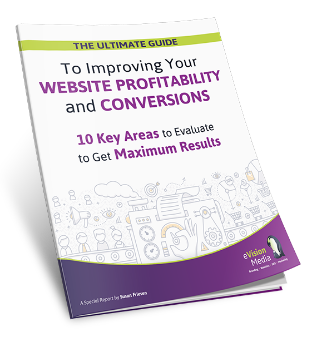Setting Yourself Apart:
The Significance of a Unique Selling Proposition
No matter what industry you operate in, if you want to succeed in business, you have to know how to differentiate yourself from the competition.
This has never been more true than it is today, as everyone seems to want to start a business, and many industries are becoming incredibly oversaturated.
At the same time, over the last few years, the marketing landscape has changed dramatically, not least because consumers are more concerned than ever about giving their business to brands they can trust, and those whose values align with theirs.
With that in mind, if you want to differentiate your brand, build trust with consumers, and ensure you stay competitive in your industry, one of the best things you can do is to identify your unique selling proposition.
Unfortunately, as I’ve seen time and time again over the years, many business owners aren’t even sure what a unique selling proposition is, and even fewer of them know how to go about defining one.
To be fair, I know this sort of thing can seem pretty overwhelming, and if you haven’t worked in marketing for decades as I have, it’s understandable that you might be somewhat unfamiliar with this concept.
But if you own a business, and you want to be able to succeed in an increasingly competitive marketplace, identifying your unique selling proposition is an absolute must.
So, if you’re looking to differentiate your business from the competition, and sustain the success of your brand, then you’re going to want to keep reading.
Because in this article, I’m going to explain what a unique selling proposition is, how it can benefit your business, and provide some advice on how you can create one of your own.
What Is a Unique Selling Proposition?
A unique selling proposition, otherwise known as a USP, is a distinctive and compelling statement that sets a product, service, or brand apart from its competitors.
It is a concise and clear expression of what makes a particular offering unique, valuable, and superior to the alternatives that are available.
A great USP focuses on the key benefits or attributes that differentiate a product, service, or brand, highlighting the specific value it provides to customers, addressing potential customers’ needs or problems, and positioning the offering as the best solution.
As I say to my consulting clients, it answers the question: Why should your ideal client choose you over your competitors?
READ: Defining Your Brand’s Purpose: The Power of Crafting a Compelling Value Statement
Crafting a unique selling proposition is one of the best things you can do for your brand, not least because it gives you a much greater understanding of your clients, competition, and offerings.
But a USP is just one of many aspects of your brand, and if you want to ensure your branding is as effective as it can possibly be, there are many other things that you’ll have to create, including what’s known as a value statement.
So, if you want to do what’s best for your brand, and you’re looking to learn what a value statement is, why it’s so important for your business, and how you can create one, then this article is for you.
What Are the Benefits of a Unique Selling Proposition?
You may think this is just a bunch of marketing mumbo jumbo, but the truth is, identifying your unique selling proposition could be one of the most beneficial things you ever do for your business brand.
Having a USP offers a litany of benefits for any business, including:
Differentiation
In a competitive marketplace, a USP sets your business apart from competitors, and it helps you to establish a unique identity, enabling customers to distinguish your business from other offerings.
This differentiation is essential for attracting attention, standing out in crowded markets, and capturing the interest of potential customers.
Competitive Advantage
A well-defined USP highlights what makes your business superior and preferable compared to the competition.
This provides a competitive advantage by showcasing the unique benefits and value that your business offers, which can help you to gain market share, attract new customers, and retain existing ones.
Targeted Marketing
A USP helps you to clearly define your target audience and tailor your marketing efforts accordingly.
And by understanding the specific needs, desires, and pain points of your target market, you can align your brand’s messaging and positioning to resonate more effectively with your ideal clients, leading to better customer engagement and higher conversion rates.
Value Communication
A USP serves as a concise and compelling way to communicate the unique value that your business provides, helping customers understand why they should choose your product or service over others.
And by clearly articulating the benefits and advantages of your offerings, a USP can help you to build trust, credibility, and confidence in both your business and your brand.
Brand Building
By becoming an integral part of your brand identity and creating a memorable impression of your business in customers’ minds, a strong USP contributes to brand development and recognition.
At the same time, it can also generate brand loyalty and advocacy, driving repeat business and word-of-mouth referrals.
Business Focus
Going through the process of crafting a unique selling proposition can help you to assess your offerings, identify the unique qualities of your business, and focus on your areas of expertise.
Having this level of understanding can help you to fine-tune your marketing, and ensure everything your business does is aligned with the value you’ve promised to deliver.
Long-Term Growth
A well-crafted USP can lead to more sustainable growth for your business.
Because if you consistently deliver on your unique selling proposition, this can help you to build trust, recognition, and loyalty with both potential and returning clients, creating the foundation for growth and profitability, and setting the stage for long-term success.
How to Create a USP
If you want to create an effective USP, you’ve got to consider many different factors, including the features of your products and/or services, which may include things like quality, price, innovation, functionality, and convenience.
It’s also important to think about things that relate to the nature of your offerings and the way you do business, like your skill set, and the kind of customer service you provide, along with where and how your products are manufactured.
When we conduct brand analyses for our clients, we explore all of these elements, but before we get into all of that, there are a couple of other things that have to be considered first.
Because defining a unique selling proposition isn’t just about highlighting the core strengths of your business, and if you want to create a USP that’s actually going to entice your ideal clients, you’ve got to have a deep understanding of both your target market and your competition.
Without this knowledge, it’s going to be very difficult to communicate what makes your offerings unique in a way that resonates with your ideal clients and properly positions your brand in relation to your competitors.
But once you’ve defined your USP, you can be truly strategic about your branding and marketing, instead of just throwing spaghetti at the wall and hoping something sticks.
With that in mind, below I’ve offered some advice on how to analyze the various aspects of your brand, so you can begin to define your USP.
Your Clients
Before you can understand the selling points of your offerings, you’ve got to get inside the heads of your ideal clients.
Because if you don’t understand the psychology of these people, then how can you possibly communicate any of this to them in a way that will actually make them interested in what you’re offering?
That being said, if you want to do a thorough analysis of your ideal clientele, then there are a lot of questions you need to answer, including things like:
- What are their demographics?
- What kinds of struggles, or issues are they dealing with?
- What’s causing these problems?
- How can my offerings help them to overcome these obstacles?
- What sort of results are they going to get after experiencing my offerings?
These are just some of the things to consider when analyzing your clientele, but even if you only answer these few questions, you should have a much better idea of who your ideal clients are and what makes them tick.
Your Competitors
Now that you understand who your ideal clients are, and know a little bit more about them, the next step is to start analyzing your competitors.
Unfortunately, in my experience, this is something that many business owners aren’t quite sure about, but this is something you have to know, as these two things go hand in hand.
Because at its core, your USP is about what sets you apart from the competition, and if you don’t know who your competitors are or what they’re doing, then you’re not going to be able to define your unique selling proposition.
With that in mind, similar to analyzing your ideal clients, if you want to analyze your competitors, there are many questions that need to be answered, such as:
- Which businesses are looking to sell to the same clientele as me, and promise outcomes that are similar to mine?
- What’s unique or different about the products and/or services that these competitors are offering?
- What problems can they solve or desires can they fulfill with these offerings?
- Why would someone be motivated to do business with these competitors?
- What benefits are these competitors able to confer to their clientele?
Again, this is only scratching the surface, but even answering these few questions should give you a much better idea of who your competitors are, and what they’re doing in relation to you.
But keep in mind that your competitors aren’t just those who are doing exactly what you do, and this needs to be looked at through the lens of where your ideal clients are going to get their problems solved or desires fulfilled.
For instance, if you’re a health coach who specializes in hormone balancing, then your competitors aren’t just other health coaches – they’re everything from doctors to social media influencers, as these are the kinds of people your ideal clientele could be going to for help with balancing their hormones.
Your Offerings
At this point, you’ve got a better understanding of both your ideal clients, and your competition, and it’s time to start analyzing your offerings.
Similar to the last two steps, this will require you to answer various questions, so you can gain greater insight into what would make people want to do business with you, how that relates to what your ideal clients want, and why it’s relevant to what your competitors are doing.
That being said, if you’re looking to do a comprehensive analysis of your offerings, here are some of the questions you should be asking yourself:
- Taking all my competitors into consideration, what can I do or provide that they cannot?
- What features of my products and/or services set my offerings apart from those of my competitors?
- Are there any unique characteristics of my company and the way it operates that differentiate me from the competition?
- Is there anything about the way I treat clients, or interact with them, that’s different from what the competition is doing?
- Why should someone hire me as opposed to one of my competitors?
Answering these few questions can give you a much better grasp on what makes your offerings unique in relation to those of your competitors, and by going through this exercise, you might be surprised at how much you can learn.
But keep in mind that it’s also very important to choose a specific niche, especially today when many industries are unbelievably oversaturated, and the spectrum of products and/or services being offered is so incredibly vast.
So, no matter what you have to offer, you should do your best to narrow down exactly what it is you do best, and try not to be too broad.
That’s not to say that you should turn people away if they don’t fit into this exact niche, but from a marketing perspective, it’s better to niche down into one specific area, as it helps to let people know that you’re the obvious choice, while differentiating you as much as possible.
Are you a high-achieving business owner struggling with the niggly details of getting noticed in this crowded online world we find ourselves in? If you’re embarrassed by your website and ready for a brand refresh so you can help more people who need you the most, I invite you to set up a free 30-minute consultation with me to get clear on how your unique brand positioning can accelerate your business growth.
To your business success,
Susan Friesen
P.S. If you liked the article, you might want to subscribe to our newsletter. We publish tons of valuable content to help you learn more about marketing, and subscribing is the best way to ensure you don’t miss out. Additionally, if you’d like to learn more about building a search engine optimized website, click here for our free website guide.








